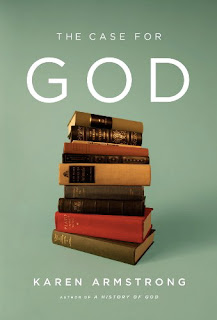
Lutheran Campus Ministry at Iowa State University hosts a "Theology for Lunch" group every Friday at noon during the school year. Last fall we tackled N.T. Wright's Surprised by Hope. This spring, because Wright wasn't deep enough, we took on The Case for God by Karen Armstrong. [check your sarcasm sensor - fully operational? Good] It was a very enriching semester for all of us.
This is my first experience with Karen Armstrong's work. Many have recommended her other works to me through the years, most especially A History of God and The Spiral Staircase. After our experience with The Case for God, I'll definitely add these titles to my list for future reading.
Contrary to what the title may lead the reader to expect, The Case for God is not an apologetic; at least, it is not an apologetic akin to anything I've previously read. As we drew near to the end of the book, I found myself mystified with the title altogether - it seems to draw the reader's attention away from the marvelous work Armstrong is doing toward an argument or proof that is never offered. Armstrong herself states that "quarreling about religion is counterproductive and not conducive to enlightenment." But she does offer, in the introduction, her rationale for this work:
The modern God is only one of the many theologies that developed during the three thousand year history of monotheism. Because "God" is infinite, nobody can have the last word. I am concerned that many people are confused about the nature of religious truth, a perplexity exacerbated by the contentious nature of so much religious discussion at the moment. My aim in this book is simply to bring something fresh to the table.
What she brings is an encompassing history of theology, religion and faith. Armstrong literally attempts to cover the waterfront: she begins in 30,000 BCE and ends with the "death of God" movement of the 1960s, the recent rise of neo-atheists and a touch of how the modern church might wish to respond. It's an ambitious project which Armstrong mostly carries off extremely well, focusing on what I believe are two main hypotheses:
- The concept of faith as cognitive assent to a list of dogmatic assertions is a very modern development, post-Enlightenment at the very least if not later; and
- The development of this concept has had an extremely detrimental effect upon the three monotheistic faiths (Christianity, Islam and Judaism) and their adherents.
In pursuit of these two hypotheses, Armstrong collects and presents an impressive collection of theologians, philosophers and intellectuals of every stripe and genre. In such an attempt, there are bound to be omissions, no matter how carefully one does one's research. I'll gladly admit that the omissions I noted were mainly of the Lutheran stripe - I would have preferred a deeper look at the Reformation, and an analysis of how the writings of Dietrich Bonhoeffer were co-opted by many in the "Death of God" movement. Others might have preferred a more detailed examination of their own faith tradition, especially as the Christian church has splintered into denominations over the past 1,000 years.
These are, however, minor quibbles. Nearly every page offers a great deal of thought-provoking analysis of religious faith, and Armstrong is remarkably even-handed in her praise and criticism. As those of us who love our churches venture deeper into the post-Christendom age, The Case for God is a valuable contribution to the church's conversation with itself and with the world in which we live. I highly recommend it, but only if you're ready to think deeply about God, theology and what it means to be people of faith.
Grace & peace,
Scott






